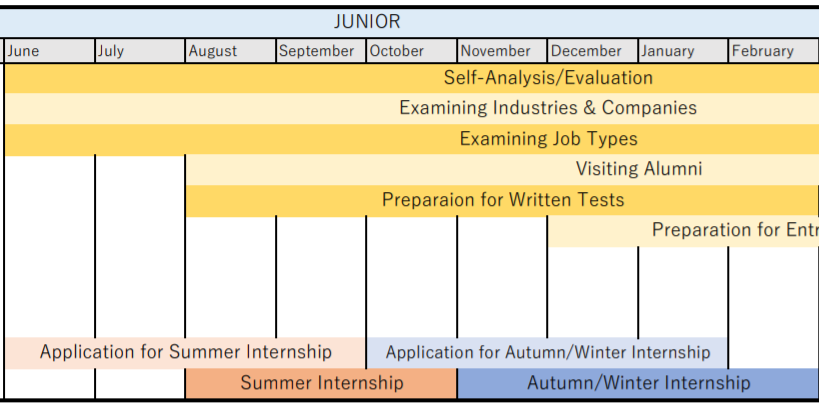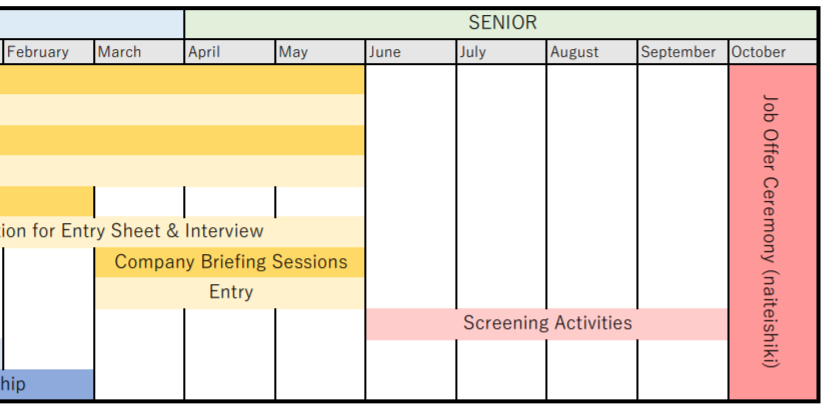Common Mistakes International Students Make
Every year we receive lots of calls from international students just several months before they graduate. They ask, “Is there any company which will hire me?”, and all we can do is to say sorry…
So we really hope that you will begin job hunting activity early enough to get “naitei (to secure a position)”.
It is important to understand the flow and the schedule of shukatsu before you regret.
Flow of Japanese Shukatsu
- Self-analysis & Evaluation
There are two purposes of self-analysis and evaluation: one is identifying the type of job you want to do, or the type of job you are suited to. And another is making a best impression in your Entry Sheet (ES) and interview. - Examining Industries & Companies
In Japan, you can find millions of companies. Industry is a classification of business operations.
For example…- Manufacturing
- trading companies
- finance
- service
- distribution and retaining
- information and communications Mass media, etc.
And you also should sign in to dodaキャンパス or OfferBox.
Here you will get some job offers from companies individually. You can use these for different purposes. - Examining Job Types
For example…- Clerical and administration
- Planning
- Sales
- Technologies and research
- Specialized
- Sales and services
- Finance
- Creative
- IT, etc.
- Visiting Alumni
You can directly visit alumni to gather information that you cannot obtain from the company website or pamphlet such as…- Specific content of work,
- Reason for entering the company
- Workplace atmosphere
- Difficulties at work, etc.
Of course, there are some online matching services: BizReach Campus is one of them. - Internships
Internship is a valuable opportunity to experience the company’s work.
It also helps you understand Japanese business manner or industries and job types.
Companies basically start inviting students who want to participate in their internships from June to July for summer internship (held in July ~ September), from September to October for autumn internship (held in October ~ December), and from November to January for winter internship(held in December ~ February).
Duration of internships varies according to each purpose or type, some only take 1 or 2 days and others 1 or 2 weeks. There is a longer type of internships called “long-term internship”, but in this case you need to join them at least 1 or 3 months. It is better to first clarify WHAT you want to obtain from the long-term internship. - Attending Company Briefing Sessions
Let’s listen to explanations provided by employment officers. This year many companies are providing online seminars/sessions due to coronavirus concerns, which makes it much easier to attend (You need to spend neither train fare nor traveling time!).
You can gather some information and feel the atmosphere within the company.
Do not forget to take a note in order to prepare questions and to improve the quality of your motivation for applying for the company. - Entry Sheet
Now most companies require you to submit entry sheet (ES) online.
Please check our article on Questions asked in a Japanese job interview if you want to know how to answer common questions asked on ES or interview.
You can also search for the company which you will apply for and see ES written by other students who applied before on ONE CAREER and unistyle. - Written Tests
There are various types of tests: SPI3, CAB, GAB, Tamate-bako (玉手箱), TG-WEB, etc.
Preparation is everything.
Visit ONE CAREER and sign in, this site will give you information about which type of test the company will require you to take.
When preparing for the tests, the most effective way to get a high score is to get a exercise book and practice all the questions at least three times. - Interview
Please check our article about Questions asked in a Japanese job interview. - Receiving a Job Offer & Entering a Company
Job Hunting Schedule


THE EASIER, THE BETTER. がんばってください!
















